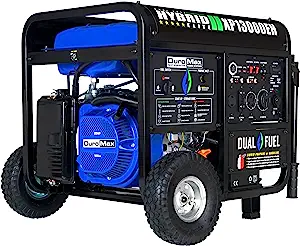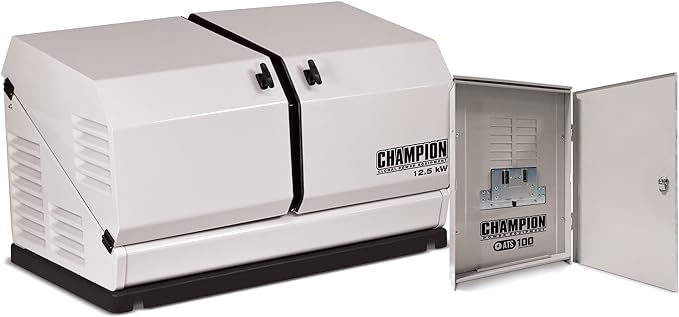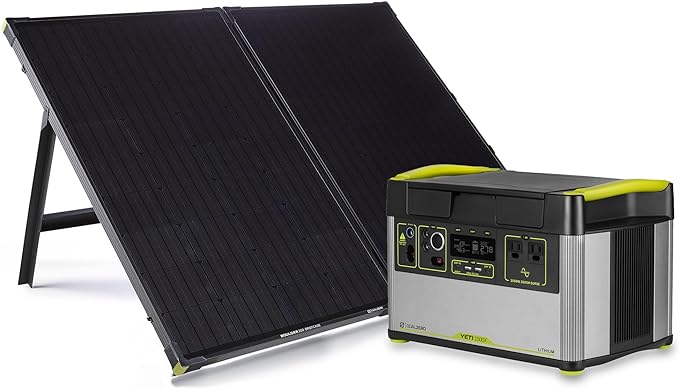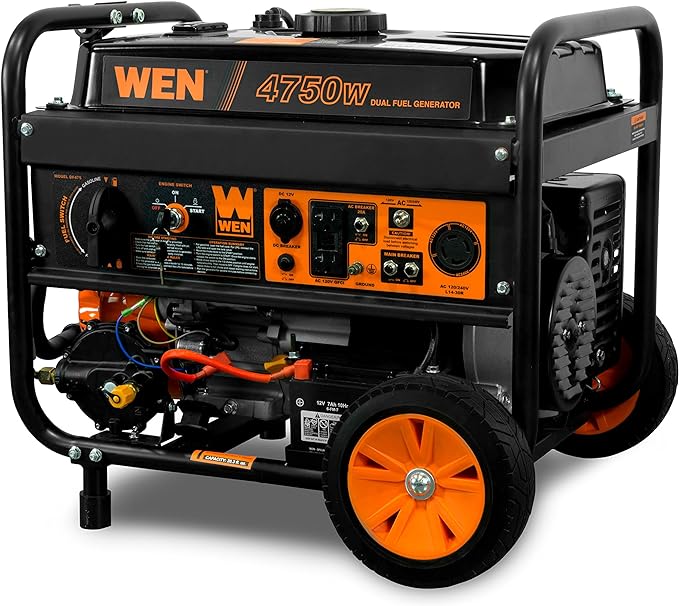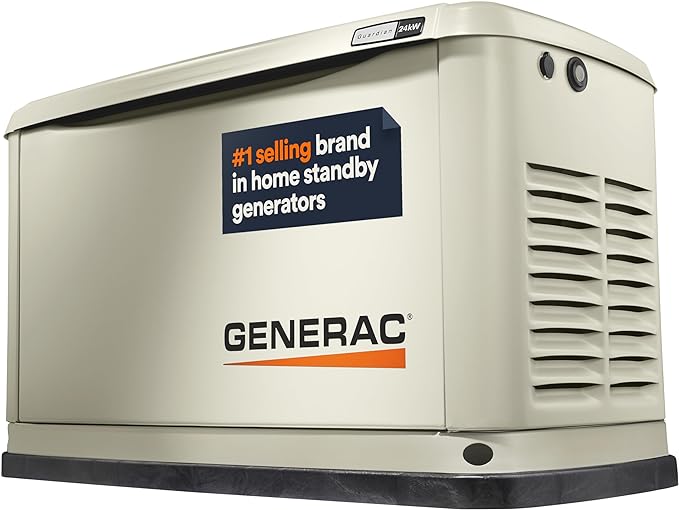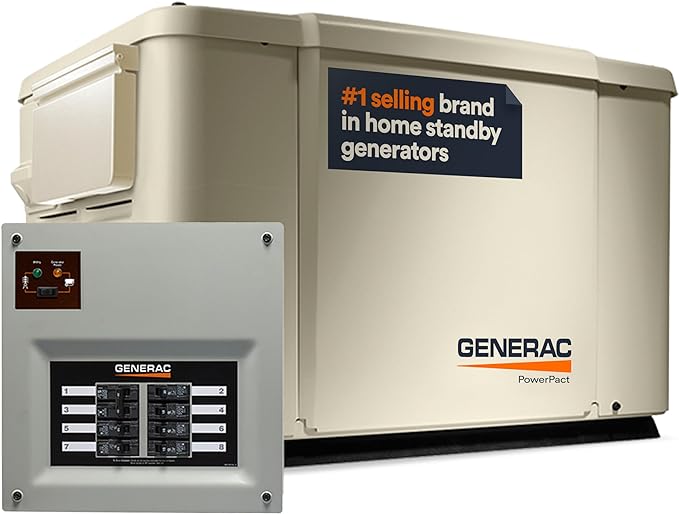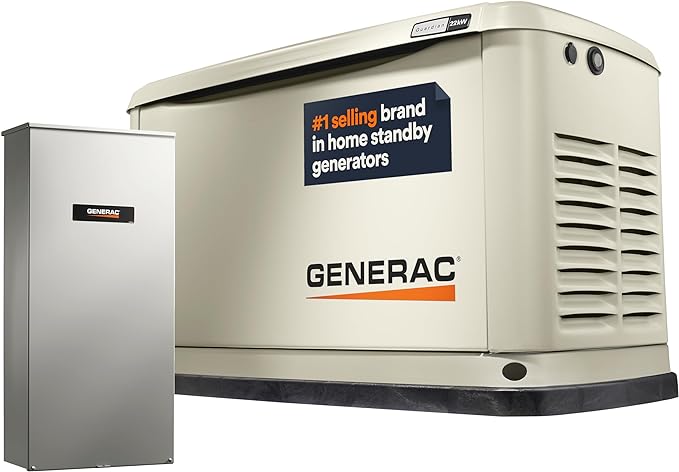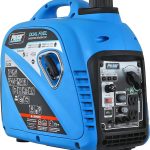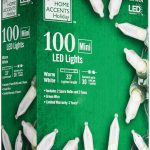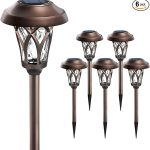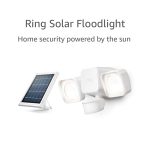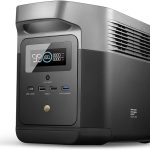When Hurricane Ida knocked out power to millions of homes in 2021, many were left in the dark, literally. You might be one of the lucky ones who invested in a reliable home generator, but if not, you’re probably wondering which one to choose from the numerous options available. From portable powerhouses like the DuroMax XP13000EH to whole-house standby generators like the Champion 12.5-kW, the choices can be overwhelming. But what makes a generator truly stand out, and which ones are worth your investment? Let’s explore the top contenders that’ll keep your lights on when it matters most.
Contents
- DuroMax XP13000EH Dual Fuel Portable Generator
- Champion 12.5-kW Home Standby Generator
- Goal Zero Yeti Portable Power Station
- WEN DF475T Portable Generator
- Generac 24kW Air Cooled Home Standby Generator
- Generac 7.5kW Air Cooled Home Standby Generator
- Generac 22kW Air Cooled Home Standby Generator
- Factors to Consider When Choosing Home Generators
- Frequently Asked Questions
- Can I Use a Generator in a Residential Area With Noise Restrictions?
- How Often Should I Perform Maintenance on My Home Generator?
- Are Home Generators Suitable for Powering Medical Equipment?
- Can I Install a Home Generator Myself, or Do I Need a Professional?
- Do Home Generators Come With a Warranty or Guarantee?
- Conclusion
DuroMax XP13000EH Dual Fuel Portable Generator
The DuroMax XP13000EH Dual Fuel Portable Generator is an excellent choice if you’re looking for a generator that can power your entire home during a storm or outage.
Offering a whopping 13,000 watts of power, this generator can keep your lights, heat, and appliances running smoothly.
This beast of a generator is built to last, with a robust DuroMax engine and a heavy-duty all-metal frame and power panel that’s free of plastic parts.
You’ll appreciate the flexibility of dual fuel technology, which lets you switch between fuel types with ease.
Plus, the push-button start and front-facing interface make it easy to change fuel types on the fly.
With a wide range of outlets, including a transfer switch-ready 50-amp outlet, you’ll be ready for anything.
Best For: Those who need a reliable and powerful generator to power their entire home during a storm or outage.
Pros:
- Powerful enough to run entire home, including heat, during a power outage
- Quiet operation, even when standing next to the exhaust side
- Excellent customer service, friendly, responsive, and accurate
Cons:
- Instructions lack clarity and critical information, especially for propane use
- Generator stalls on propane when in low idle mode
- Lack of information on fuel valve switch and choke operation
Champion 12.5-kW Home Standby Generator
The Champion 12.5-kW Home Standby Generator is a reliable backup power source that can seamlessly provide 12,500 watts of continuous power to your home during an outage.
This generator is designed to provide quiet and efficient power, with a noise level of 63 dBA, making it perfect for residential areas.
The 24-volt starting system guarantees reliable operation, even in extreme temperatures.
With its innovative gull-wing design, you’ll have easy access to the engine and control panel.
The ATS100 automatic transfer switch can handle a 100-amp, 16-circuit load, making it ideal for powering essential appliances during an outage.
Best For: Homeowners who want a reliable and quiet backup power source that can seamlessly provide power to their essential appliances during an outage.
Pros:
- Provides 12,500 watts of continuous power to support essential appliances during an outage
- Quiet operation with a noise level of 63 dBA, making it suitable for residential areas
- Innovative gull-wing design for easy access to the engine and control panel
Cons:
- Weighs 455.5 pounds, which may make it difficult to move or install
- Requires regular maintenance and self-diagnostic tests to ensure reliability
- May not be suitable for large homes or those with high power requirements
Goal Zero Yeti Portable Power Station
The Goal Zero Yeti Portable Power Station is the best choice for homeowners who need a reliable and versatile backup power solution for their essential appliances during outages.
It has an impressive 1516 Wh battery capacity and 2000 W AC inverter.
The durable construction features an anodized aluminum enclosure and tier 1 lithium battery cell, which guarantees safe electric and solar power with heavy-duty construction and quiet operation.
This portable power station is also incredibly versatile, with 10 ports, including USB ports and an AC inverter, allowing you to power everything from refrigerators and microwaves to TVs and computers.
Plus, it’s easy to recharge, with options to use a solar panel, wall charger, or car charger, making it the perfect solution for your backup power needs.
Best For: Homeowners who need a reliable and versatile backup power solution for their essential appliances during outages.
Pros:
- Durable construction with anodized aluminum enclosure and tier 1 lithium battery cell for safe electric and solar power
- Versatile with 10 ports, including USB ports and an AC inverter, allowing you to power a wide range of appliances
- Easy to recharge with options to use a solar panel, wall charger, or car charger
Cons:
- Heavy at 45.6 lbs due to aluminum housing
- Battery not replaceable like the older Yeti 1400 Lithium
- Premium pricing
WEN DF475T Portable Generator
The WEN DF475T Portable Generator is a top choice for homeowners seeking a reliable and versatile power source, offering dual fuel capability and an impressive 4750 watts of power.
With its 4-gallon tank, you can enjoy up to 11 hours of runtime at half-load capacity.
The electric start feature makes it easy to get started, and the transfer switch ready design facilitates a seamless shift between power sources.
You’ll appreciate the variety of outlets, including two 120V GFCI outlets, a 120V/240V NEMA 30A twist lock, a 12V DC cigarette-lighter-style plug, and a wheel and handle kit for easy transport.
Best For: Homeowners seeking a reliable and versatile power source for their homes, campsites, or job sites.
Pros:
- Offers dual fuel capability, allowing users to switch between gasoline and propane for added convenience
- Provides an impressive 4750 watts of power, making it suitable for powering multiple appliances and tools
- Features an electric start, making it easy to get started with minimal effort
Cons:
- Some reviewers have reported issues with shipping damage or missing parts
- Weighs 105.8 pounds, making it heavy and potentially difficult to transport
- Has a relatively high price point compared to other portable generators on the market
Generac 24kW Air Cooled Home Standby Generator
When the lights go out, the Generac 24kW Air Cooled Home Standby Generator seamlessly takes over, providing automatic backup power to safeguard your family and home during power outages.
You’ll appreciate the peace of mind that comes with knowing your home is protected, thanks to this generator’s advanced technology and reliable performance.
With its 24,000-watt capacity, it can power your entire home, including essential circuits, and even has Wi-Fi connectivity for remote monitoring.
Plus, its quiet-test self-test mode and 5-Year Limited Warranty guarantee long-term assurance and minimal maintenance.
Best For: Homeowners who want comprehensive protection for their home and family during power outages, especially those who live in areas prone to frequent outages.
Pros:
- Provides automatic backup power during power outages, ensuring safety and convenience for homeowners
- Offers Wi-Fi connectivity for remote monitoring, allowing homeowners to stay informed and in control
- Has a quiet-test self-test mode and a 5-Year Limited Warranty, guaranteeing long-term assurance and minimal maintenance
Cons:
- Has a high noise level, which can be disturbing for some homeowners
- Has had instances of damage during shipping, which can lead to inconvenience and delay
- Has had issues with customer support, which can be frustrating for homeowners who need assistance
Generac 7.5kW Air Cooled Home Standby Generator
The Generac 7.5kW Air Cooled Home Standby Generator is an excellent choice for a reliable backup power source that can handle your home’s essential appliances during an outage.
This generator features True Power Technology, which guarantees best-in-class power quality with less than 5% THD.
The 50-Amp 8-Circuit Transfer Switch makes it easy to switch between utility and generator power.
The user-friendly Evolution Controller features LED indicators for generator status, utility power presence, or maintenance requirements.
The generator has a durable aluminum enclosure with a powder-coat finish, making it built to last.
With Mobile Link remote monitoring, you can keep an eye on your generator from anywhere in the world.
Best For: Homeowners who want a reliable and convenient backup power source for their essential appliances during outages.
Pros:
- Reliable power source with True Power Technology for best-in-class power quality
- Convenient transfer switch and user-friendly Evolution Controller for easy operation
- Durable aluminum enclosure and powder-coat finish for long-lasting performance
Cons:
- High installation cost
- Poor warranty service
- Limited customer support
Generac 22kW Air Cooled Home Standby Generator
With its impressive 22,000 watt power delivery and less than 5% total harmonic distortion, this Generac 22kW Air Cooled Home Standby Generator is the best choice for homeowners seeking thorough protection and reliable power backup during outages.
You’ll appreciate its thorough protection, smart controls, and versatile power capabilities, which safeguard your home stays powered up even when the grid goes down.
Plus, with Wi-Fi connectivity, you’ll receive real-time updates on your generator’s performance.
The 200-amp NEMA 3R smart switch provides whole-house protection, and the 5-year limited warranty gives you peace of mind.
Engineered and assembled in the USA, this generator is built to last, with a purpose-built G-Force Engine that reduces maintenance needs.
Best For: Homeowners seeking reliable power backup and thorough protection during outages.
Pros:
- High power delivery of 22,000 watts with less than 5% total harmonic distortion
- Whole-house protection with 200-amp NEMA 3R smart switch
- Wi-Fi connectivity for real-time updates on generator performance
Cons:
- Mixed opinions on noise level and customer support from customers
- Heavy item weight of 466 pounds
- Higher price point compared to other generators in the market
Factors to Consider When Choosing Home Generators
When selecting a home generator, you’ll need to ponder several key factors to guarantee you get the right one for your needs.
You’ll want to think about how much power you need, what type of fuel you want to use, and how much noise you’re willing to tolerate.
Power Output Needs
You’ll need to determine the power output requirement of your home generator based on the total wattage of the appliances and devices you want to power during an outage. A minimum of 5,000 watts is recommended for small to medium-sized homes, but larger homes or those with multiple HVAC systems, electric water heaters, or electric dryers may require 10,000 watts or more.
When calculating your power output needs, don’t forget to take into account the starting wattage requirements of appliances with motors, like refrigerators and air conditioning units. These can be three to five times their running wattage, so make sure to factor that in.
You should also think about the type of power you need – some generators only provide 120-volt power, while others can handle 240-volt power for heavier appliances like electric dryers and ranges.
To be safe, guarantee your generator by oversizing it by 1-2 kilowatts to account for future additions or increased energy demands. By carefully calculating your power output needs, you can verify your home generator can handle everything you need it to during an outage.
Fuel Type Options
Your home generator’s fuel type is a critical factor to weigh, as it directly impacts the convenience, cost, and environmental impact of your backup power system.
With various fuel options available, you’ll want to deliberate which one best suits your needs.
Dual fuel generators, for instance, offer flexibility, allowing you to switch between gasoline and propane based on your needs.
If you’re looking for a reliable source of energy during extended outages, natural gas generators are a popular choice for whole-house backup power.
Propane generators, on the other hand, are a good option for areas where natural gas isn’t available, and they can be more environmentally friendly than gasoline-powered generators.
Additionally, some generators can run on multiple fuel types, such as gasoline, propane, and natural gas, providing the ultimate flexibility.
When deciding on a fuel type, ponder factors like fuel availability, cost, and environmental concerns to make certain you choose the best option for your home.
Noise Level Concerns
As you weigh the pros and cons of different fuel types, another critical consideration emerges: the noise level of your home generator.
You’ll want to think about how much noise you’re willing to tolerate, especially if you plan to use the generator in a residential area or during nighttime hours.
The noise level of a generator is typically measured in decibels (dB), ranging from 60 dB to over 90 dB, with higher numbers indicating louder operation.
Factors like engine size, type, and speed, as well as the design of the enclosure and muffler system, can affect the noise level.
The EPA recommends a maximum of 70 dB to minimize disturbance to humans and wildlife.
If you’re looking for a quieter option, look into inverter generators, which typically operate at around 50-60 dB, making them suitable for camping or residential areas.
When choosing a generator, bear in mind the noise level to guarantee you get one that fits your needs and won’t disturb you or your neighbors.
Portability and Size
When it comes to choosing the right home generator, two essential factors to think about are portability and size, which greatly impact the unit’s convenience, safety, and overall performance.
You’ll want to ponder whether you need a portable generator that’s easy to move around, or a stationary one that’s more powerful but heavier.
If you’re planning to use your generator for camping, RVing, or small to medium-sized homes, a portable option might be the way to go.
These units are typically lighter and more compact, weighing between 100-300 pounds, making them easy to transport. Look for models with wheels and handles, like the WEN DF475T, which are designed for easy movement.
On the other hand, if you have limited space or need a generator for small power needs, an inverter generator like the Goal Zero Yeti might be a better fit.
These units are often more compact and lightweight, making them perfect for camping, RVing, or small power needs.
Whatever your needs, make sure to examine the space available for installation and the weight and size of the unit to guarantee safe and convenient operation.
Budget and Value
After considering the importance of portability and size, you’ll need to weigh the financial implications of your home generator purchase, as the cost can vary greatly depending on the type and features you need.
The price range is vast, spanning from a few hundred dollars for a small portable unit to over $10,000 for a whole-house standby generator.
When setting a budget, consider the size of the generator, fuel type, and features required. These factors substantially impact the overall cost.
While a higher upfront cost may seem intimidating, investing in a high-quality generator can provide long-term value and savings through reliable performance, reduced maintenance, and extended lifespan.
Balance the initial cost with potential savings and benefits, such as avoiding food spoilage, maintaining comfort and safety during power outages, and protecting sensitive electronics.
Don’t be tempted by budget-friendly options that may require frequent repairs, maintenance, or even replacement, ultimately costing more in the long run.
Frequently Asked Questions
Can I Use a Generator in a Residential Area With Noise Restrictions?
You’re wondering if you can use a generator in a residential area with noise restrictions. Generally, you’ll need to check local ordinances and homeowners’ association rules to verify the generator’s decibel level complies with noise limits.
How Often Should I Perform Maintenance on My Home Generator?
You should perform routine maintenance on your home generator every 1-3 months, depending on usage, to guarantee it runs efficiently and safely, checking oil, filters, and spark plugs, and running it for 30 minutes monthly.
Are Home Generators Suitable for Powering Medical Equipment?
You’re wondering if home generators are suitable for powering medical equipment. Yes, they can be, but you’ll need to guarantee the generator’s power output and voltage stability meet the specific requirements of your medical device.
Can I Install a Home Generator Myself, or Do I Need a Professional?
As you venture on this electrifying journey, you wonder if you can tame the beast of installation alone. But, beware, a professional’s steady hand is often needed to guarantee a safe, code-compliant connection that won’t leave you in the dark.
Do Home Generators Come With a Warranty or Guarantee?
You’re probably wondering if your investment’s protected – most generators come with a warranty or guarantee, typically ranging from 2 to 5 years, covering repairs or replacements for manufacturing defects or faulty parts.
Conclusion
You’ve got the power to choose from the best home generators, but you might be thinking, ‘Aren’t they noisy and bad for the environment?’
Not necessarily! Many modern generators prioritize quiet operation and eco-friendliness.
With the right model, you can enjoy reliable backup power without sacrificing your values.
By considering factors like fuel type, wattage, and noise level, you’ll find a generator that fits your needs and lifestyle.
